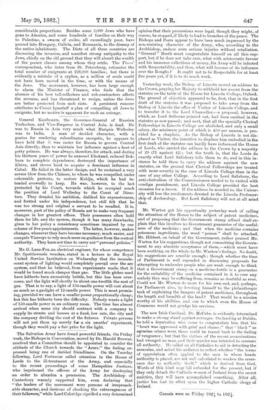Yesterday week, the Bishop of Lincoln moved an address to
the Crown, praying her Majesty to withhold her assent from the statutes on the table of the House for Lincoln College, Oxford. The ground of objection appeared to be, first, that in the first draft of the statutes it was proposed to take away from the Bishop of Lincoln the office of Visitor of Lincoln College, and to transfer it to the Lord Chancellor,—a proposal, however, which, as Lord Selborne pointed out, had been omitted in the statutes as now passed ; and next, that all the specially Clerical Fellowships in Lincoln College are abolished, and only a small salary, the minimum point of which is £50 per annum, is pro- vided for a chaplain. As the Bishop of Lincoln is not dis- placed as Visitor, the intention to displace him embodied in the first draft of the statutes can hardly have influenced the House of Lords, who carried the address to the Crown by a majority of 29 (71 against 42) ; but the truth is, that the Lords do exactly what Lord Salisbury tells them to do, and in this in- stance he told them to carry the address against the new statutes, on the ground that Clerical Fellowships are treated with more severity in the case of Lincoln College than in the case of any other College. According to Lord Salisbury, the anti-clericalism of the Commissioners needed to be visited with condign punishment, and Lincoln College provided the best occasion for a lesson. If the address be acceded to, the Univer- sity will lose the emoluments devoted to the Lincoln Professor- ship of Archmology. But Lord Salisbury will not at all mind that.
































 Previous page
Previous page